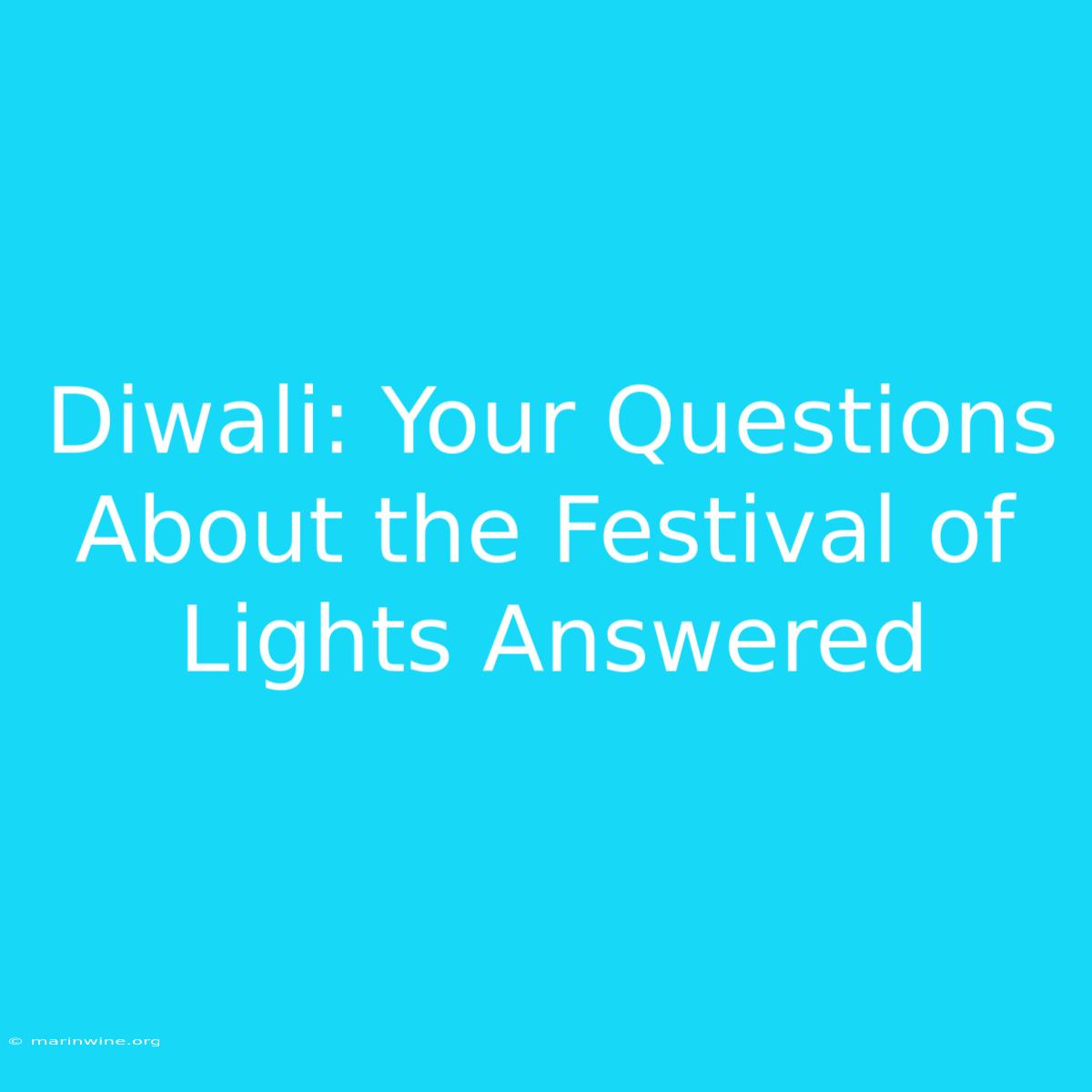Diwali: Your Questions About the Festival of Lights Answered
Is Diwali just about lights? You'd be surprised to know that Diwali, the festival of lights, is much more than a visual spectacle. It's a celebration of victory, prosperity, and new beginnings!
Why should you care about Diwali? Understanding Diwali offers a glimpse into rich cultural traditions, beautiful rituals, and a spirit of joy that transcends borders.
Key Takeaways of Diwali:
| Takeaway | Description |
|---|---|
| Celebration of Light | The festival is marked by lighting diyas (oil lamps) and candles, symbolizing the triumph of good over evil. |
| Triumph of Good | Diwali commemorates Lord Rama's return to Ayodhya after defeating Ravana. |
| Prosperity and Wealth | Diwali is also associated with Lakshmi, the goddess of wealth, and people pray for prosperity and good fortune. |
| New Beginnings | Diwali marks the beginning of a new year according to the Hindu lunar calendar. |
Diwali: A Celebration of Light and More
The Significance of Lights
Diwali's most prominent feature is the illuminating of diyas and candles. This symbolizes the dispelling of darkness and ignorance, representing the victory of good over evil. Just like the diyas illuminate homes, the festival encourages inner enlightenment and a positive outlook.
Beyond the Lights: The Story of Rama and Sita
Diwali commemorates Lord Rama's return to Ayodhya after defeating Ravana, the demon king, and rescuing his wife Sita. This epic tale from the Hindu epic Ramayana emphasizes the triumph of righteousness and the importance of virtue. Diwali symbolizes the victory of good over evil and the triumph of justice.
The Role of Lakshmi: Goddess of Wealth and Prosperity
Diwali is also associated with Lakshmi, the goddess of wealth and prosperity. People decorate their homes and businesses with intricate rangoli designs, and offer prayers to Lakshmi for a prosperous year ahead. The festival encourages the pursuit of material well-being alongside spiritual growth.
Diwali: A Time for Renewal and New Beginnings
Diwali coincides with the new year according to the Hindu lunar calendar, making it a time for fresh starts. People clean their homes, wear new clothes, and exchange gifts, reflecting the spirit of renewal and optimism associated with the festival. Diwali is a time for reflection, forgiveness, and embarking on a new chapter.
The Connection Between Diwali and Modern Society
Diwali's traditions resonate with modern society's values of unity, tolerance, and inclusivity. The festival highlights the importance of celebrating diversity and embracing different cultures.
Diwali and the Power of Storytelling
Diwali's stories, like the Ramayana, offer timeless lessons on good governance, social justice, and personal responsibility. These narratives inspire people to strive for a better world and to contribute to the common good.
Diwali: A Celebration for Everyone
Diwali's vibrant traditions and universal messages of hope and prosperity make it a celebration that transcends borders and cultures. Whether you're participating in the festival's rituals or simply appreciating its cultural significance, Diwali offers an opportunity to connect with the deeper meaning of light and its power to transform.
Diwali: A Time for Reflection and Gratitude
Diwali reminds us of the importance of finding joy in the simplest things – the glow of diyas, the laughter of loved ones, and the promise of a brighter future.
FAQ for Diwali:
| Question | Answer |
|---|---|
| When is Diwali celebrated? | Diwali is celebrated in October or November, depending on the Hindu lunar calendar. |
| What are some Diwali traditions? | Lighting diyas, decorating homes, sharing sweets, bursting firecrackers, praying to Lakshmi, and wearing new clothes. |
| What are some Diwali foods? | Sweets like laddoos, barfi, and gulab jamun, savory snacks like samosas and pakoras, and traditional meals like biryani. |
| How can I celebrate Diwali? | Participate in Diwali events, attend puja ceremonies, light diyas, share sweets, and enjoy the festive atmosphere. |
| What is the significance of bursting firecrackers? | It is a tradition believed to ward off evil spirits. However, it is becoming increasingly discouraged due to pollution concerns. |
| What are some ethical ways to celebrate Diwali? | Focus on eco-friendly decorations, use less firecrackers, and promote awareness about sustainable practices. |
Tips for Celebrating Diwali:
- Light Up Your Home: Decorate your home with diyas, candles, and rangoli patterns. This symbolizes welcoming prosperity and good fortune.
- Share Sweet Treats: Prepare or purchase traditional Diwali sweets to share with family and friends. This symbolizes sharing joy and celebrating togetherness.
- Offer Prayers: Pray to Lakshmi, the goddess of wealth, for prosperity and good fortune.
- Embrace the Spirit of Giving: Donate to charity or help those in need. This embodies the spirit of Diwali, which emphasizes generosity and compassion.
- Celebrate with Loved Ones: Spend time with family and friends, and create lasting memories. Diwali is a time to connect with loved ones and cherish their company.
Summary by Diwali:
This article has explored the multifaceted nature of Diwali, encompassing the celebration of light, the triumph of good over evil, and the significance of prosperity and new beginnings. Diwali offers a timeless message of hope, unity, and the importance of pursuing a brighter future.
Closing Message:
Diwali's message of light and hope resonates across cultures and time. Let's embrace this spirit and strive to create a world that shines with kindness, compassion, and unwavering belief in the power of good.

